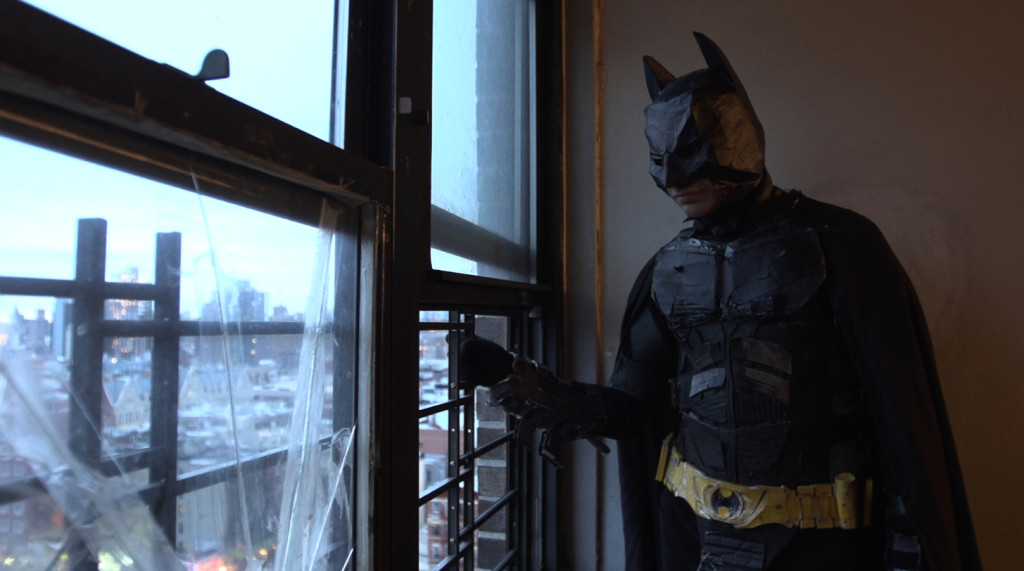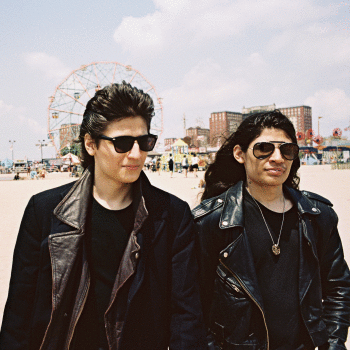Six boys with Sanskrit names with waist-length hair live with their parents and sister in the projects in the lower east side of Manhattan. They range in age from 16 to 24, have been home-schooled, and — with the exception of the occasional excursion supervised by their father — are forbidden to leave their apartment. To occupy themselves, they start watching films and they become obsessed with films, and they started reenacting the films they love. One day, one of the brothers escapes.
It sounds like the plot of a psychological thriller, but it’s a real-life story captured in the new documentary “The Wolfpack,” directed by Crystal Moselle. It won the Grand Jury Prize at Sundance this year, and it gets released in theaters this weekend.

Brendan Francis Newnam: Crystal, welcome. I think anyone who watches this film will want to know: how did you get to know the Angulo brothers?
Crystal Moselle: I was their first friend. I was walking down First Avenue and they run past me on the street and they had this long hair and sunglasses, all wearing black. And something about them just really intrigued me. And I just instinctually ran after them.

Brendan Francis Newnam: And we learn they’ve been brought up in isolation, they’ve been taught to fear strangers, and although that wall from the world started to crumble at some point, they still have a lot of fear inside. How were you able to win their trust?
Crystal Moselle: We had this common interest–
Brendan Francis Newnam: Movies.
Crystal Moselle: Cinema, movies. And so, that’s really what the friendship was based on. When I first met them, I didn’t have any idea what their backstory was. I was just really interested in them as people.
Brendan Francis Newnam: Why did their father, Oscar, keep them inside?
Crystal Moselle: I think that, initially, he wanted to have control of his family. He kind of like, had these ideas of starting his own community and having his children be a part of that.
Brendan Francis Newnam: I think it’s safe to say he has a messiah complex.
Crystal Moselle: Yeah.
Brendan Francis Newnam: And, he wanted the power of a god in that house, he controlled everything that came in and out of that household. How did he succeed in doing that in modern New York?
Crystal Moselle: Through manipulation and mind control.
Brendan Francis Newnam: I understand maybe how he would have power over the kids, but were there social workers or? How did the system lose track of these guys?
Crystal Moselle: No, I mean that’s the thing is that they were legally home-schooled. They lived in the projects, so there was contact, you know, to the outside world. It was just they weren’t venturing out.

Brendan Francis Newnam: In watching the movie, they seem so sweet and so open, and it seems like once you’ve won their trust, they let you into their world and talked in a way that kids between the age of 16 and 20 normally wouldn’t talk, and one can’t help but think that’s partially because they were kept separate from the typical kind of–
Crystal Moselle: Absolutely.
Brendan Francis Newnam: In what other ways did their isolation affect their personalities?
Crystal Moselle: Yeah, I mean, their interests were pretty sophisticated. Narayana–
Brendan Francis Newnam: He’s one of the brothers.
Crystal Moselle: Yeah. The way he speaks about cinema and Terrence Malick and… it felt like I was talking to a peer and somebody who had been in the film world for like, 25 years. And here, there’s these children. But, you know, the thing though is that it is — it was very focused on cinema.
Brendan Francis Newnam: At one point, one of them says that he felt like he was forced to think more because he was living in his mind because he was living in this apartment instead of in the world.
Crystal Moselle: Yeah.
Brendan Francis Newnam: So, their father wouldn’t let them go out in the real world, but he allowed them to watch whatever they wanted. And then they started living through these films. What did movies provide for them, in your opinion?
Crystal Moselle: I think the movies were a way of escaping, and I think that they were able to live through these characters and experience being empowered.

Brendan Francis Newnam: Yeah.
Crystal Moselle: When there’s this sense of control being taken away from you, they were able to feel that control within these characters. Let’s say like a “Reservoir Dogs” character.
Brendan Francis Newnam: Or The Dark Knight.
Crystal Moselle: Yeah. Yeah. He’s able to act out these emotions through this character. And I think eventually that’s what empowered him to walk out that door.
Brendan Francis Newnam: And eventually, Mukunda, one of the brothers, does walk out the door, and it’s the first break in this sort of wall that the father created. And eventually, all the boys end up getting out. Tell us how that played out in the family.
Crystal Moselle: So, when Mukunda walked out that door, he was wearing a mask.
Brendan Francis Newnam: Yeah.
Crystal Moselle: From the movie “Halloween.”
Brendan Francis Newnam: Because he didn’t want people to see him–
Crystal Moselle: He thought he’d be able to disguise himself.
Brendan Francis Newnam: Yeah. But it’s an all-encompassing mask. You show it in the film. It’s not just like a Halloween mask, it goes over his head.
Crystal Moselle: Yeah, it’s frightening.
Brendan Francis Newnam: It’s really creepy, serial killer style.
Crystal Moselle: Yeah. And so he got picked up by–
Brendan Francis Newnam: By the police.
Crystal Moselle: The authorities. And he ended up at Bellevue — just for an evaluation — and after that, things really started to change in the household. I think their father realized that it was time for them to actually start going out on their own. And they basically band together and created their own pack within the house, which kind of took down–
Brendan Francis Newnam: The father, the patriarch.
Crystal Moselle: Took down the alpha male, the current alpha male, and they started going out. They just didn’t ask and, they say the first day that they all went out together as a group was the day they met me.
Brendan Francis Newnam: What about that part of this process? You are not only a filmmaker, but you were their friend, as you say, and for a while there you were, I imagine, you were kind of teaching them about the outside world. You were like a liaison. How did you balance those roles?

Crystal Moselle: I think that that’s the nature of being a documentary filmmaker. It’s like, how do you draw those lines and… I don’t think that I drew any lines and maybe that’s not the right thing to do, but that’s what I did.
But I think that’s just how the story had to be told, and I think that’s how there’s a trust because we had an actual, real friendship between us before it was really decided to do this film.
Brendan Francis Newnam: The father — who you ultimately interview in the movie — it seemed like, absent all of his mental problems, he was going for something special. Like he wanted to be a musician. At one point, we learn that he wanted the guys to be in a band, you almost think about the Jackson 5.
Crystal Moselle: No, their dad’s cool. I mean it’s — he dresses cool, he has cool ideas, he understands what’s hip. But, his actions didn’t match up to that.
Brendan Francis Newnam: Well, that’s so — that’s what I was gonna say. You intimate that he was abusive, he was a drinker. So, in a way, making this movie, did you ever wonder… are you validating his choices by creating this special thing, right? By bringing these kids around the world.
Crystal Moselle: Yeah, I mean it’s this crazy thing because his intentions for his kids are almost coming true. Maybe not exactly how he saw it, but yeah.
Brendan Francis Newnam: Yeah. But he leaves the viewer feeling a little morally uncomfortable just because it seemed like it was a pretty ugly process to have them arrive where they arrive, but you are — you’re just in awe of these boys and what they’re doing.
Crystal Moselle: Yeah. I mean, that’s the thing, it’s like, at least at this point it’s positive and they’re learning what happiness is.


